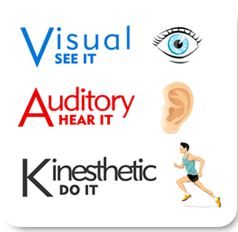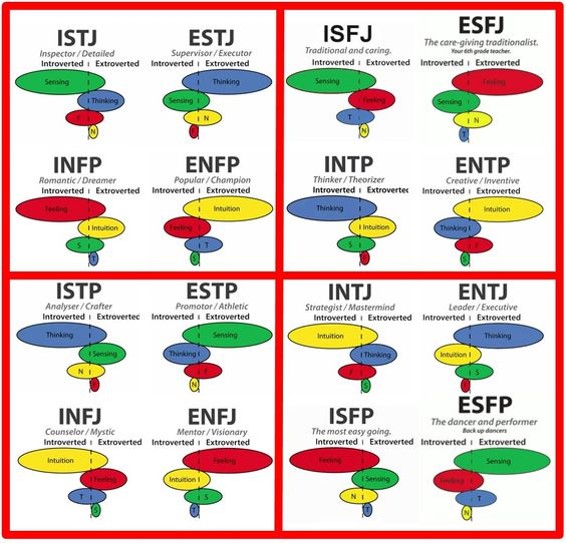Yesterday, we took a brief look at learning styles and MBTI personalities. At the workshop, students encountered the three major learning styles and were introduced to the 16 different MBTI personality types.
First, students watched a video on thinking fast and thinking slow, which delved into the concepts of the conscious vs. the subconscious mind. You can watch it here: Brain Tricks – This Is How Your Brain Works.
 Students then learned about the three major learning styles: auditory; visual; kinesthetic. The presentation discussed the differences between them, including a video demonstrating such differences. We discussed how the learning styles differ when applied to the study of law. Visual learners learn best when information is presented in a written language or via pictures or diagrams. Auditory learners learn best when information is presented in a spoken language format. Kinesthetic learners learn best when they can use their sense of touch and move about.
Students then learned about the three major learning styles: auditory; visual; kinesthetic. The presentation discussed the differences between them, including a video demonstrating such differences. We discussed how the learning styles differ when applied to the study of law. Visual learners learn best when information is presented in a written language or via pictures or diagrams. Auditory learners learn best when information is presented in a spoken language format. Kinesthetic learners learn best when they can use their sense of touch and move about.
In practical application, these learning styles are not set in stone. While people tend to have a preference for one style over another, they can develop all of the learning styles. This makes studying etc. much more effective.
You can find out your learning style by taking any one of these tests:
Seguing from learning styles to personality types, Dr. Brosseit spoke on “Using Psychological Type Theory to Optimize Performance in the Study and Practice of Law.” He began with a few important points:
- Understanding psychological type makes students aware of their natural ways of thinking so they can better understand their behaviors and select the approaches most likely to optimize performance in any given situation.
- The instrument/indicator does not dictate your psychological type; it is merely a tool to help you determine your type for yourself.
- No single psychological type is inherently better suited for the study and practice of law.
- While psychological type often indicates the approaches that are most likely to be effective for particular personality types, students with the same psychological type are not all identical in their learning behaviors.
Dr. Brosseit went on to discuss the differences between the four dichotomies that make up the MBTI: Direction of Energy (E vs. I); Perception (S vs. N); Judgment (T vs. F); and Lifestyle Orientation (J vs. P).
- Direction of Energy: how one communicates and applies information
- Extraversion (E)
- Focus on the world outside of themselves
- Talk things through with others as a means of gaining deeper understanding of information
- Introversion (I)
- Prefer to operate in their inner world to ponder ideas and understand information
- Share ideas to check the accuracy of their understanding only after they have fully thought through and understood the information
- Extraversion (E)
- Perception: how one gathers and processes information
- Sensing (S)
- Focus on concrete information, specific scenarios, and practical application of legal rules and standards
- Like to read cases and see detailed examples before constructing an overview or employing inductive reasoning to form broad generalizations
- Intuition (N)
- Naturally see connections, patterns, and broader principles among cases, context, rules, and principles
- Prefer to see a general overview to have a roadmap or framework for understanding before reading specific cases or employing deductive reasoning to analyze specific fact patterns
- Sensing (S)
- Judgment: how one evaluates situations and makes decisions
- Thinking (T)
- Naturally focus on objective, logical application of law to facts
- May tend to value justice over mercy
- Feeling (F)
- Evaluate cases by engaging in factual scenarios and identifying one or the other of the parties to assess the impact of judicial reasoning on the people involved
- May tend to value mercy over justice
- Thinking (T)
- Lifestyle Orientation: how one conducts day-to-day life
- Judgement (J)
- Apply evaluative processes to organizing personal and professional life
- Prefer to follow set schedules, keep materials and notes organized, and complete assignments before deadlines
- Perceiving (P)
- Value flexibility to adjust to new information or changes in the environment
- Prefer to work in spurts when inspired or pushed by deadlines
- Judgement (J)
Dr. Brosseit mentioned an intriguing chart that displayed the different MBTI types and what their primary vs. secondary etc. functions were. Of note, extroverts extravert their primary function while introverts extravert their secondary function. This means that extroverts continually show their best function to the world while introverts show their second best. Knowing this, an introvert can work at overcoming this tendency.

 Dr. Brosseit also looked into how the MBTI types are distributed amongst lawyers. Of note, the top six types found in lawyers are:
Dr. Brosseit also looked into how the MBTI types are distributed amongst lawyers. Of note, the top six types found in lawyers are:
- ISTJ (17.8%)
- ESTJ (10.3%)
- INTJ (13.1%)
- ENTP (9.7%)
- INTP (9.4%)
- ENTJ (9.0%)
You may notice that the top six types are all of the (T) variety. This does NOT mean that Feelers cannot be successful lawyers. It simply means that the (T) type is more prominent in the legal community.
If you don’t know your MBTI type, check out this free unofficial MBTI indicator. We recommend that you take it a few times or take a few different indicators in order to best know your MBTI type.
If you’re interested in how your psychological type can help you as a law student and future attorney (or as an attorney already), check out this book: Juris Types: Learning Law through Self-Understanding by Martha M. Peters & Don Peters. This book looks into things such as study approaches, organization methods, exam preparation strategies, exam taking techniques, strategies for legal practice, and much more!
We hope you found this information as fascinating and useful as we did! Knowing your learning style and, more importantly, your MBTI type can help you learn and study more efficiently and effectively; however, this knowledge goes beyond law school. Learning about who you are and how you think and act and why as well as why other people around you act the way they do can mean the difference between happiness and misery in your life.








